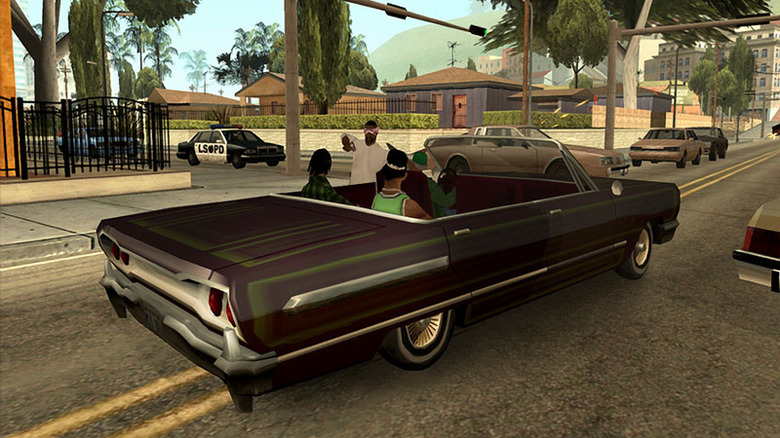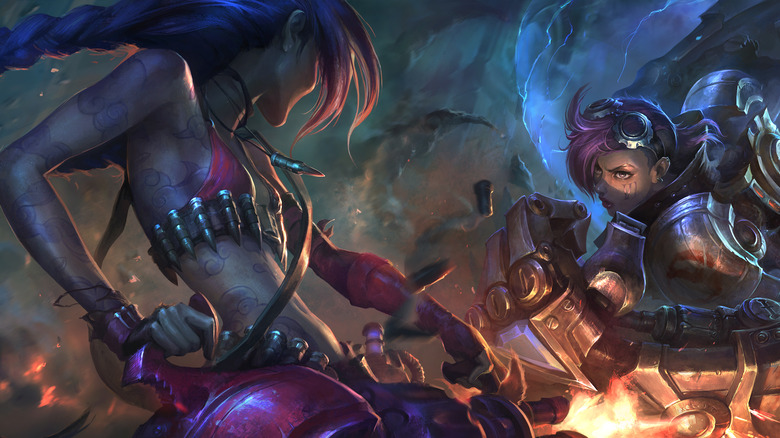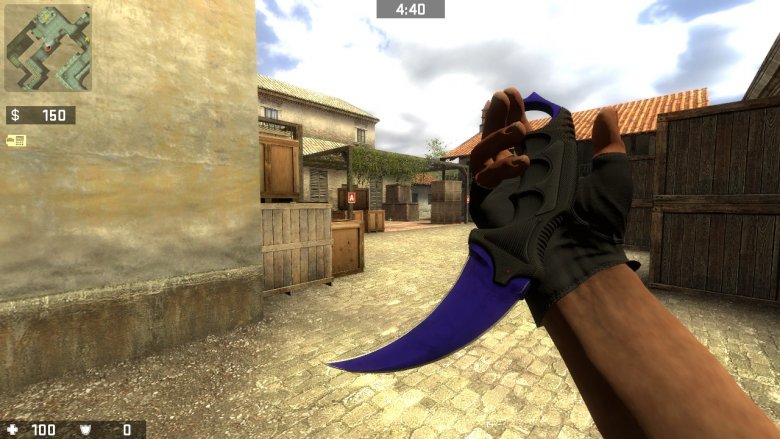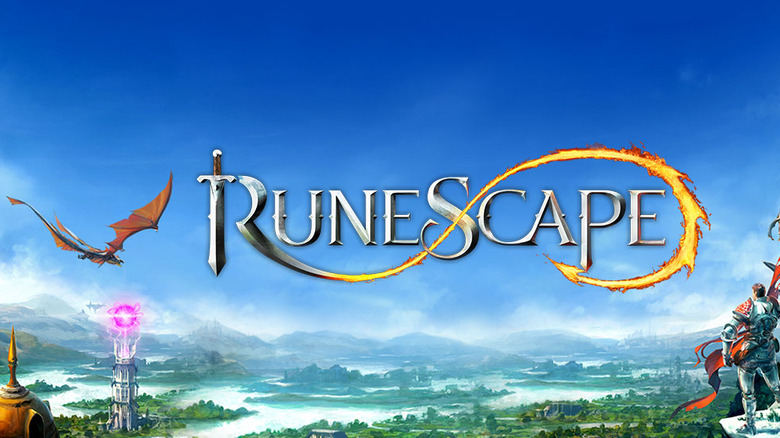Games That Sent People To Jail
Video games have a way of transporting us to a different time and place. Sometimes they even transport us to an entirely different personality. Gaming can let you be someone you're not and do something you would never do in real life.
Most people can say that they've never been to an underwater city run by an objectivist capitalist in a corrupt free-market. But that doesn't mean they haven't been there through the medium of gaming. And while the experiences had in games can influence one's real life, some things just shouldn't translate from the screen to outside world. While trying to ram into as many cop cars as possible in Grand Theft Auto might be fun, it wouldn't necessarily be advisable in real life.
And on that note, we look at some people who got into trouble for taking their gaming lives a bit too far. Their stories range from the comic to the tragic, but they all have one thing in common: they very much needed a "get out of jail free" card to translate into the real world.
Mixing LSD with GTA is never a great idea
In early 2018, Oregon resident Anthony Clark decided to pull a little grand theft auto of his own. Police were attempting to tow a car from a gas station that had been confiscated from a drunk driver. Seeing this, Clark made the decision to take the car ... and then informed officers he'd be doing just that. While this may have seemed like a joke, Clark was dead serious.
Not waiting for the cops to leave, Clark commandeered the 2003 Toyota Camry and led the police on a 40-mile-long high-speed chase through Jackson County. During the course of the chase, Clark rammed through several chain-link fences, ran over two different sets of spike strips, and drove on the wrong side of several roads. One officer bumped the rear of the car, causing Clark to spin out. In true GTA fashion, Clark attempted to ram the patrol car. When that failed, he fled to a nearby trailer park where he tried to steal another car, unsuccessfully.
Once caught, Clark told police officers that he had been tripping on LSD and was convinced that he was actually in the game Grand Theft Auto. He used this as a means of trying to explain his bold and less-than-prudent actions. This explanation, however, didn't stop Clark from being arrested for (among many, many other things) unauthorized use of a motor vehicle. Which doesn't roll off the tongue nearly as well as GTA.
When thinking up creative threats, cannibalism is a bit too extreme
In February of 2013, 18-year-old Justin Carter got into an argument with another gamer on Facebook about League of Legends. While the argument started off innocently enough, Justin was soon set off by a remark. The online antagonist questioned Carter's mental stability, to which he replied with an incredibly disturbing and disproportionate response. Carter stated that he was going to shoot children at a nearby elementary school and eat their still-beating hearts.
Carter reportedly followed his remark up with something to the effect of "LOL" or "JK" in an attempt to indicate this was a joke, but one woman who saw the comment on Facebook wasn't taking any chances. She called the police, who swiftly sprang into action. The authorities were on high alert as Carter lived less than a mile from a nearby elementary school. On top of that, there had been a shooting at another school in Connecticut only a month before. With a search warrant obtained, Carter was arrested with his bond set at $500,000.
Though no weapons or dangerous substances were found at Carter's house, suggesting his threat really may have been in jest, he was still kept in jail. That's one way to deal with toxic League players.
"Wow" is right
Who needs gaming skills when you can just snap the fingers of your magical Thanos-style gauntlet and make all of your enemies disappear instead? This seemed to be the logic of our next offender. In 2010, Romania's 38-year-old Calin Mateias overloaded one of Blizzard's servers in order to prevent others from playing World of Warcraft. The attack cost Blizzard over $30,000 as they tried to counter the damage done by Mateais.
Mateais launched a DDoS attack on the server when access to the 2010 Cataclysm expansion was given to European players. He didn't want his in-game rival getting ahead of him in the game. His attack flooded the servers with a large amount of traffic. This made the servers inoperable for thousands of European players, effectively shutting things down.
Mateias was extradited to the United States to face federal charges for his cyber attack. He pled guilty to the charges raised against him and was sentenced to a 10-month prison sentence for his actions and the thousands of dollars in damages he had cost Blizzard. His rival, meanwhile, is probably a higher level than him now.
There's a reason Pokemon Go warns to "always be aware of your surroundings"
Church may not be for everyone, but for those who don't enjoy it, they tend to stay away from the institution altogether. This wasn't the case for 21-year-old Russian YouTuber Ruslan Sokolovsky who filmed himself playing Pokemon Go in The Church of All Saints in Yekaterinburg in 2016. Of course, he did this despite the fact that people were being threatened with jail time for this very thing. Sokolovsky asked in his YouTube video, "How can one be offended by entering a church with a smartphone? I believe it's both safe and not prohibited by law."
Knowing he would face jail time, Sokolovsky proceeded to film himself playing the game in the church. He then posted the video on his YouTube channel for the world to see, which was viewed over 900,000 times (though it now appears to be pulled). Many people were upset by Sokolovsky's subsequent incarceration for simply playing a game, but the authorities argued that his actions were "inciting hatred and offending religious sensibilities." Despite protests, Sokolovsky was sentenced to two months in jail and faced five years in prison. Upon hearing the news of Sokolovsky's incarceration and the outrage of many on his behalf, Yevgeny Roizman, the mayor of Yekaterinburg said, "You can't arrest a man for idiocy."
Winner, winner ... jail time?
Who doesn't want that delicious chicken dinner promised at the end of a PlayerUnknown's Battlegrounds victory? Although most gamers will spend time trying to improve their skills in order to win said victory, others take a different approach. In early 2018, in anticipation of its release in China, Tencent Holdings Ltd. enlisted the help of the Chinese police force to track down and arrest those found cheating in PUBG. This included those creating software to provide players with x-ray vision and auto-targeting, among other things. In early 2018 the police arrested over 120 people and opened 30 cases against these cheating rings.
Because gamers in China account for more than half of the game's 27 million users, keeping the game enticing for honest players was Tencent's top priority. Tencent knew casual players would be deterred by the unfair advantage granted to cheaters. This, in turn, would drastically reduce the amount of active players in PUBG, causing Tencent to take a big financial hit. With this in mind, those disrupting servers have faced up to five years in prison. The moral of this story is that cheaters never prosper ... unless you're playing The Sims.
Grand Theft Innocent Bystander?
Wish fulfillment was high on the list of priorities for 20-year-old college student Zachary Burgess. In 2013, Burgess decided that playing Grand Theft Auto on his console simply wasn't quite immersive enough for him. Claiming he wanted to live out the game, Burgess stole a truck before kidnapping a woman in Baton Rouge, LA. He went on a joyride with the kidnapped woman but ended his night of fun differently than he'd expected. Crashing his car into nine parked cars that blocked his way, Burgess attempted to push through the blockade, to no avail. In the wake of his failure, Burgess abandoned the truck and left the kidnapped woman behind.
Burgess was being detained by citizens who had seen the disaster unfold by the time police arrived. He was later arrested and sent to jail for theft of a motor vehicle, kidnapping, and nine counts of hit and run. After living through this, it's probably safe to say that living out GTA wasn't quite as fun as Burgess thought it would be.
The World Cup of scams
Microtransactions in games can be addicting. That's why so many free-to-play games are so successful. They know you can't resist the alluring call of dropping $10 of your real-world money on a new character slot or an amazing weapons upgrade that was just added to the in-game store. When four men from the U.S. got tired of spending their own money on in-game currency, they wrote a program that would allow them to steal over $16 million dollars worth of FIFA coins in FIFA Football.
Their program could log thousands of FIFA matches in only seconds. FIFA coins are rewarded for time spent playing the game. 24-year-old Anthony Clark and his three accomplices were able to collect a large amount of coins that they hadn't actually earned. But they didn't stop there. Once they'd obtained their ill-gotten-gains, they sold the in-game currency on the secondary market for real money, defrauding the gaming company for millions of dollars. After the four men were caught, they pled guilty to their crimes and were convicted.
A counter-strike against your Counter-Strike enemy
No one ever said that, as a gamer, you need to take the title of the game you're playing too literally. But apparently 20-year-old Julien Barreaux missed that day in gaming etiquette 101. In 2010, Barreaux's character was stabbed after getting into a scuffle online in Counter-Strike. This incident set Barreaux off: he spent six months tracking down the real-life location of the player who had killed his avatar. He found that the player lived only a few miles away from him in the town of Cambrai near Paris, France.
Armed with this information and a kitchen knife, Barreaux went to the house of his rival. When the man answered the door, Barreaux stabbed the man in the chest, narrowly missing his heart. Barreaux's victim, Mikhael, survived the stabbing with less than an inch of leeway between the knife and a fatal blow. Barreaux was arrested within the hour by authorities. He told them he wanted his in-game rival wiped out for killing his avatar. Barreaux was sentenced to spend two years in prison and is required to receive some much-needed anger management courses for his almost-deadly outburst.
Well that escalated quickly
Here we have another classic example of an overreaction to taunting by a fellow gamer. Gamers are typically used to trolls trying to make their gaming experience less-than-enjoyable. It's an unfortunate side-effect of being in the gaming world. But 19-year-old Josh Pillault didn't exactly let one troll's comments roll off his back like he should have. In 2013 a fellow gamer in Runescape began antagonizing Pillault with some admittedly inappropriate goading that went too far. Pillault responded by offhandedly dropping references about Columbine High School and mentioning that he may also "take out" his local school. The gamer who had been goading Pillault then called authorities, sending them over to Pillault's home. The federal authorities raided the home and arrested Pillault.
As with the case of Justin Carter and his threat to go shooting at a school, no evidence was found in Pillault's home to suggest that he was serious about his threat. While Pillault and his mother both insisted that it was an off-color joke, Pillault was still kept in jail for nine months and faced an additional ten years in prison for his comment. Many still protested that the punishment was much too harsh for an off-handed comment made by an immature teenager who didn't understand the implications of his words. From now on, we're assuming he'll understand the weight his words can carry.
Copyrights, counterfeits, and conspiracies
In 2006, 48-year-old game tech, David Foley, sold the rights to his gaming software used for arcade games along with his company, UltraCade Technologies. Global VR bought the rights to Foley's software and UltraCade and made him their chief technology officer. While working for Global VR, Foley decided to earn some extra money for only half of the work. He took the game data he'd created and had already sold to Global VR and re-sold it to another company. On top of that, he sold it to this other company under the name UltraCade, which was Foley's original company he'd sold to Global VR in the first place.
Once Global VR learned of this fraud, they swiftly fired Foley. But Foley's fraud didn't stop there. After being fired by Global VR, Foley defrauded a home lender out of $3 million, telling him that he was still employed by Global VR. In the end, Foley's lack of honesty landed him with two years in federal prison.











